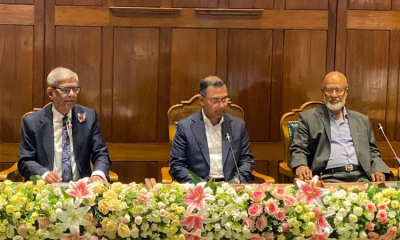Prime Minister Sheikh Hasina on Tuesday called upon development partners, including multilateral financing institutions, to extend their support for the cause of community-centric health services in the developing world, reports UNB.
“On our part, Bangladesh stands ready to share our insights and expertise with those interested. Health is at the root of all happiness. We wish to spread happiness all around through the community clinics,” she said.
The prime minister said this while speaking at the Plenary Session of the High-level Side-Event on “Sheikh Hasina Initiative of Community Clinics: Innovative Approach to Achieving Universal Health Coverage Inclusive of Mental Health and Disabilities” held at UN Headquarters here.
The high-level event was jointly organised by Antigua and Barbuda, Bangladesh, Bhutan, China and Malaysia.
She mentioned that community-based primary health care is key to achieving Universal Health Coverage.
“As an emerging voice of the Global South, Bangladesh would champion this issue as a possible avenue for meaningful international partnership,” she said.
Hasina also shared her vision with five priorities for the community clinics.
These are:
First: To make community clinics serve as gatekeepers at the grassroots to prevent huge out-of-pocket payments for health services;
Second: To enable community clinics to provide enhanced digital health and diagnostic services, especially for NCDs;
Third: To further develop the capacity of community clinics to address growing climate-induced health crises, like dengue outbreaks;
Fourth: To improve screening and treatment facilities for mental health and neurological disorders so as to provide accessible services to those affected and their families; and,
Fifth: To use community clinics as the primary building block for a robust data-driven health and nutrition programme.
PM Hasina said that there are now nearly 14,500 community clinics operating across the country. They are designed to act as a one-stop centre for health, family planning, and nutrition-related services.
The community clinics are playing a critical role in reducing infant, child, and maternal mortality, she said.
She mentioned that around 3,000 community clinics offer facilities for skilled birth attendance. On average, there are 9.5 to 10 million visits to the community clinics every month. Among the service seekers, almost 80 percent are women and children.
The premier said that community clinics have become the local hub for universal immunisation. They played a crucial role in securing COVID-19 vaccination coverage.
“There is also scope for screening non-communicable diseases as well as mental health and neurological disorders. We plan to use community health care providers to combat social stigma with mental health and extend psychosocial support where possible,” she stated.
She said that it remains critical to update the training and competence of the community health workforce.
At the community clinics, she said, the government is providing 27 essential medicines and three family planning materials free of charge. “We have decided to replace antibiotics with anti-diabetic and anti-hypertensive agents.”
She mentioned that the community clinics act as a referral point for emergencies and complicated cases to higher medical facilities.
The service providers are equipped with the internet and digital devices to record health data. They also engage in communication on social and behaviour change for health and disability-related issues, she added.
The Prime Minister said that community clinics are expected to cover 6,000 people each. They are based on a unique model of public-private partnership, with the local people providing the land and the government bearing the operational costs. They are managed by local representatives drawn from different segments of society, with the mandatory participation of women.
“In 2001, with the BNP-Jamaat government coming to office, the community clinics were abandoned and thrown into neglect for nearly seven years,” she said.
In this connection, Sheikh Hasina said that the government in 2009 realised at that point that the revival and sustainability of community clinics would only depend on local people acting as their owners, stewards, and custodians.
This model perhaps explains why 90 percent of service seekers express their satisfaction with community clinics, she added.
“In 2018, our Parliament passed the Community Clinic Health Support Trust Act to further streamline operations and funding modalities,” said Hasina.
Prime Minister of Sint Maarten Silveria Jacobs, among others, spoke at the high-level side event, while Health and Family Welfare Minister of Bangladesh Zahid Maleque delivered the introductory speech.
Later, PM`s daughter Saima Wazed, who is CVF Thematic Ambassador on Vulnerabilities and Member of Chatham House Commission on Universal Health, addressed the technical session of the high-level side event as the keynote speaker.












-20260217073221.webp)




-20260216115008.webp)














